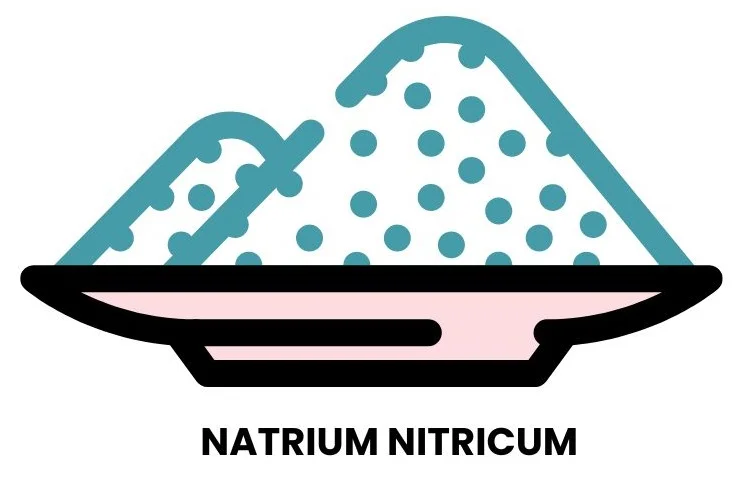Natrium Nitricum, commonly known as Nitrate of Sodium, is a homeopathic remedy used for a variety of ailments, particularly those involving inflammation and bleeding disorders.
It is beneficial for respiratory issues, urinary conditions, and certain systemic diseases.
The remedy also addresses symptoms of fatigue and exhaustion, which necessitate frequent rest.

Table of Contents
ToggleSOURCE INFORMATION
Origin and Historical Facts
- Origin: Natrium Nitricum is derived from Nitrate of Sodium, a chemical compound found in nature and produced synthetically.
- It is commonly used in agriculture as a fertilizer and in the food industry as a preservative.
- Historical Facts: Historically, Natrium Nitricum has been used in various medicinal applications due to its anti-inflammatory and antiseptic properties.
- It gained prominence in homeopathy through the work of Dr. Rademacher, who recognized its potential in treating inflammation and bleeding disorders.
DRUG PATHOGENESIS
- Natrium Nitricum works by addressing the underlying causes of inflammation and bleeding within the body.
- It is particularly effective in conditions where there is a tendency for hemorrhage, whether in the lungs, urine, or under the skin.
- The remedy helps to manage symptoms associated with exhaustion and chronic conditions, improving overall vitality.
KEY CHARACTERISTICS
- Inflammation and Haemorrhage: Effective for various types of inflammation and bleeding.
- Respiratory Issues: Addresses symptoms such as coughing up blood.
- Urinary Conditions: Treats blood in the urine and other urinary tract issues.
- Systemic Diseases: Useful for conditions like Purpura Haemorrhagica and Haemorrhagic Variola.
- Fatigue and Exhaustion: Helps with symptoms of extreme tiredness and the need for frequent rest.
DETAILED ORGAN SYMPTOMS
HEAD
- Dull Headache: A constant dull pain in the head, often leading to a feeling of heaviness.
- Mental and Physical Exhaustion: Lack of desire to engage in mental or physical activities.
- Pressing Pain: A sensation of pressure inside the head.
- Otalgia: Ear pain, often due to inflammation.
- Malar Pain: Pressure in the cheekbones.
- Nosebleed: Frequent bleeding from the nose.
STOMACH
- Sour Risings: Acidic belching that leaves a sour taste.
- Aversions to Coffee: Dislike or intolerance for coffee.
- Flatulence: Excessive gas in the stomach, causing discomfort.
- Pressure in Stomach and Chest: Sensation of heaviness and discomfort, worsened by movement and relieved by belching.
ABDOMEN
- Painful Contractions: Muscles of the abdomen feel tightly contracted towards the spine.
- Distension: Feeling of fullness and bloating.
- Difficult Stool: Difficulty in passing stool, with a sensation that more stool remains.
HEART
- Heart Pain: Discomfort in the region of the heart.
- Slower Pulse: Noticeably slower heart rate.
- Softer Pulse: Weaker and less forceful pulse.
MODALITIES
- Worse: Motion
- Better: Eructation (belching)
RELATIONSHIP WITH OTHER DRUGS
- Compare With: Other remedies used for inflammation and bleeding disorders, such as Hamamelis and Phosphorus.
- Antidote: Pulsatilla and Guaiacum can help mitigate the effects of Natrium Nitricum.
DOSE
- Second Trituration: Commonly used potency.
- Watery Solution: One dram of salt dissolved in 8 ounces of water, taken in dram doses.
Frequently Asked Questions (FAQs)
What conditions can Natrium Nitricum treat?
- Natrium Nitricum is effective for various inflammatory conditions, respiratory issues like haemoptysis, urinary tract problems such as haematuria, and systemic diseases like Purpura Haemorrhagica.
How does Natrium Nitricum help with fatigue?
- The remedy helps by addressing the underlying causes of exhaustion, improving vitality, and reducing the need for frequent rest.
What are the key symptoms indicating the need for this remedy?
- Key symptoms include dull headaches, mental and physical exhaustion, sour risings, flatulence, painful abdominal contractions, heart pain, and a slower pulse.
How should Natrium Nitricum be administered?
- It is commonly used in the second trituration potency or as a watery solution, with one dram of salt dissolved in 8 ounces of water, taken in dram doses.
Meaning of Difficult Words
- Haemoptysis: Coughing up blood from the respiratory tract.
- Haematuria: Presence of blood in the urine.
- Purpura Haemorrhagica: Spontaneous bleeding into the skin and mucous membranes.
- Haemorrhagic Variola: Severe form of smallpox involving bleeding.
- Tabes: Progressive wasting of the body, especially seen in the late stages of syphilis.
- Influenza: Common viral infection affecting the respiratory system.
- Hemoglobinuria: Presence of haemoglobin in the urine, often due to the breakdown of red blood cells.
- Uric Acid Diathesis: Predisposition to developing conditions related to excess uric acid, such as gout.
- Anaemia: Condition characterized by a deficiency of red blood cells or haemoglobin.
- Hydraemia: Excessive dilution of the blood.
- Eructation: Belching or burping.
- Otalgia: Ear pain.
- Malar Bones: The cheekbones.
- Flatulence: Excessive gas in the digestive tract.
- Subinvolution: Failure of the uterus to return to its normal size after childbirth.
- Aphthous Ulceration: Painful, small ulcers inside the mouth.
